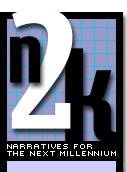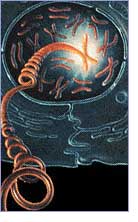









|
The Writing Genome/Writing the Genome
"I look to science to nourish my visions in which all heaviness disappears. Today every branch of science seems intent on demonstrating that the world is supported by the most minute entities, such as the messages of DNA, the impulses of neurons, and quarks, and neutrinos wandering through space since the beginning of time...Then we have computer science... Is it legitimate to turn to scientific discourse to find an image of the world that suits my view? If what I am attempting here attracts me, it is because I feel it might connect with a very old thread in the history of poetry." (I. Calvino, "Lightness," Six Memos fo the Next Millennium, trans. W. Weaver, p.8). "...And when I say 'dying of love,' - Qfwfq went on, - I mean something you have no idea of, because you think falling in love has to signify falling in love with another person, or thing, or what have you, in other words I'm here and what I'm in love with is there, in short a relationship connected to the life of relationships, whereas I'm talking about the times before I had established any relationships between myself and anything else, there was a cell and the cell was me, and that was that...So I'm speaking of the initial phase of a love story which afterward repeated in an interminable multiplication of initial phases just like the first, a multiplication or rather a squaring, an exponential growth of stories which is always tantamount to the first story..." (from: I. Calvino, "Priscilla. Mitosis," Tzero,transl. W. Weaver, New York: Harcourt Brace, 1969, pp. 59-61). |
|
 "The hereditary information in each human being - the genome -
can be viewed as a 'book' containing about three billion characters
of text written into molecules of DNA. This is no metaphor. The
text of my genome is as real as discrete as the text of this review
(which, as I write, exists only as a string of bits on a computer
disk). Over the last two decades, scientists have created machines
that automatically 'read' text from DNA and 'write' it into computer
memory. The
"The hereditary information in each human being - the genome -
can be viewed as a 'book' containing about three billion characters
of text written into molecules of DNA. This is no metaphor. The
text of my genome is as real as discrete as the text of this review
(which, as I write, exists only as a string of bits on a computer
disk). Over the last two decades, scientists have created machines
that automatically 'read' text from DNA and 'write' it into computer
memory. The 
